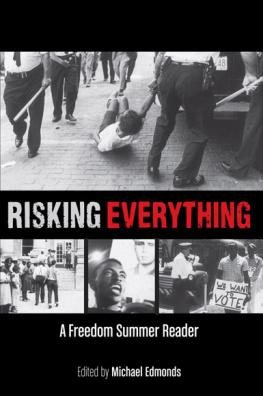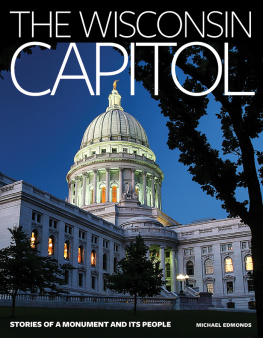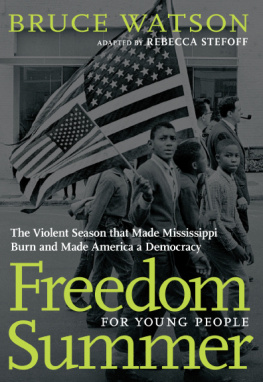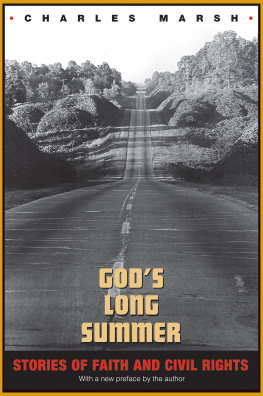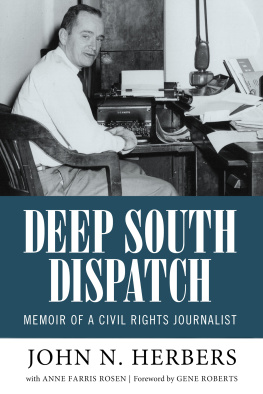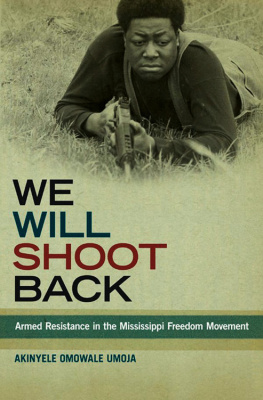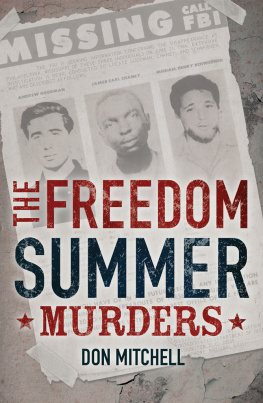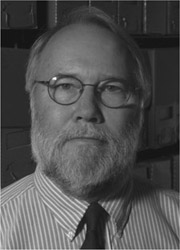
Photo by Joel Heiman
Michael Edmonds is Deputy Director of the LibraryArchives at the Wisconsin Historical Society and curator of its online collection of more than 30,000 pages documenting Freedom Summer. A 1976 graduate of Harvard University, he earned an MS degree at Simmons College in 1979 and taught part-time at the University of WisconsinMadison from 1986 to 2010. For the last decade he has led the teams that share the Societys manuscripts, photographs, and rare books on the web. The author of several articles and books, Edmonds has won national awards from the American Folklore Society and the American Association for State and Local History.
The civil rights workers who created these documents deserve not just our thanks but that of the entire nation. We are especially grateful to those who allowed us to print writings from fifty years ago that are still protected by copyright: Elizabeth Aaronsohn, Joel Bernard, Charles E. Cobb Jr., Jerry DeMuth, Robert Feinglass, Walter Kaufmann, Ellen Lake, Charles McLaurin, the Reverend Charles Sherrod, and the Reverend David Steffenson. We also thank Matt Herron, the Newseum, and Harvey Richards for letting us use their images.
We owe another debt of gratitude to the activists-turned-archivists who collected most of these manuscripts in the South in 1966 and 1967: Bob and Vicki Gabriner, Alicia Kaplow, Gwen Gillon Ozanne, Mimi Feingold Real, and Leah Johnson Wise. Without their foresight and dedication, many of these documents would not have survived at all.
Movement veterans Bruce Hartford, Mary Elizabeth King, Lisa Anderson Todd, and Leah Johnson Wise critiqued early drafts of chapters or the Societys Freedom Summer 50th anniversary exhibit text. Their tactful criticisms saved me from misconstruing important aspects of the Mississippi Summer Project. Errors that survived despite their generosity are entirely my own.
For digitizing, indexing, editing, and interpreting archival documents, thanks are due to Jonathan Cooper, Diane Drexler, Laura Gottlieb, Laura Kearney, Chris Lay, Steve Nonte, and Antonia Rath. Dave Deprey and Sarah McDole performed essential image research.
Finally, this book would never have been begun without the vision and support of Matt Blessing and Kathy Borkowski.
AFTERWORD:
FREEDOM SUMMER DOCUMENTS
By September 1, nearly all of the 1,500 volunteer students, lawyers, doctors, nurses, and clergy had gone home. In their luggage were hundreds of manila envelopes and file folders stuffed with handouts, diaries, newsletters, snapshots, and similar papers theyd accumulated. These scattered across the country like leaves on the wind, dropped into file drawers, tucked away in shoeboxes, slipped under beds, and jammed into closets from New York to Los Angeles.
Most of Freedom Summers leaders and office staff left Mississippi, too. After the betrayal in Atlantic City, the projects directors went to Africa at the invitation of entertainer Harry Belafonte. Most of the paid staff gradually spread out among other CORE and SNCC projects in Louisiana, Georgia, and Alabama. In the Jackson COFO headquarters, discipline gave way to dissension in the fall of 1964; in small cities and towns, black residents struggled to keep local offices alive; all across the state, the communications and organizing infrastructure shut down. The office files that documented Freedom Summer were boxed up and pushed aside.
The survival of the projects records had always seemed precarious. Instructions to local projects had required that every written record of importance should have at least four copies: the original and carbon copies were to be sent to COFO, CORE, and SNCC staff in Jackson, Greenwood, and Atlanta. But that rule was often ignored because there was no culture of record keeping. Members were suspicious of paper trails and documentation, which they associated with the dominant power structure. I want you to know that I am not making a carbon copy of this letter, SNCCs Jane Stembridge wrote to her colleague Mary King, because when one makes carbon copies, one is either assuming one has something to say, or is assuming that we are involved in a business that
It was also hard to document events because they unfolded so quickly. Many things which are happening now and should be preserved are not being recorded, reflected SNCC supporter Lucile Montgomery. Of course, the people who know most about what is going on are so busy making it happen that they cant stop long enough to write it down. And when thorough records were kept, they were vulnerable to theft, vandalism, and arson. After the Tupelo and Indianola COFO offices were firebombed in 1964 and 1965, police and firefighters swooped in immediately to carry off all the files that could identify local civil rights workers.
Records in local homes and freedom houses were often discarded by their creators. Southern black communities had safeguarded their memories for generations with oral traditions. Denied formal schooling and exploited by legal forms and documents, they didnt necessarily value records kept on paper. People who could accurately recite their history out loud often assumed that nobody would ever want their old letters, memos, and clippings.
So it was with a sense of urgency that a handful of history students who had volunteered in the South approached Wisconsin Historical Society director Les Fishel in December 1964 with a proposal to collect civil rights manuscripts.
Mimi Feingold had arrived in Madison as a history graduate student at the end of August. While an undergrad at Swarthmore, shed been arrested during one of the first Freedom Rides. Shed postponed graduate school for a year to organize residents in Louisiana with CORE before coming to the University of Wisconsin. She soon connected with Bob and Vicki Gabriner, whod also arrived that fall. Theyd spent the previous summer in West Tennessee working with the local black community. Our minds were
The Wisconsin Historical Society was a second home for history students. Several, including Feingold, found part-time jobs there that fall. Other student workers in the Society archives included sophomore Chris Hexter, whod been a Freedom School teacher in Ruleville, Mississippi, that summer; grad student Danny Beagle, whod volunteered in West Tennessee with the Gabriners; and Alicia Kaplow, another sophomore, whod spent the summer of 1964 raising money for the Mississippi Freedom Democratic Party.
Although they studied hard, Bob recalls, We didnt see ourselves in academic careers. They saw themselves as political activists making a temporary detour through academia. Vicki remembers, We were always trying to figure out ways to bring those two pieces of our lives together. One way to integrate politics and academia was collecting records of the civil rights movement, especially those created at the grassroots level.

